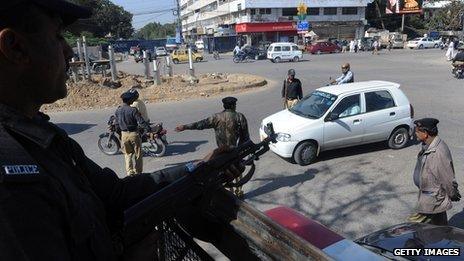Profile: Mullah Abdul Ghani Baradar
- Published

Mullah Baradar was arrested in the southern city of Karachi
Mullah Abdul Ghani Baradar is one of the four men who founded the Taliban movement in Afghanistan in 1994.
He went on to become a linchpin of the insurgency after the Taliban were toppled by the US-led invasion in 2001.
He was eventually captured in a joint US-Pakistani raid in the southern Pakistani city of Karachi in February 2010.
Little was heard of Mullah Baradar's fate until late in 2012 when his name repeatedly topped the list of Taliban prisoners the Afghans wanted released in order to encourage nascent peace talks.
Pakistani officials released Mullah Baradar on 21 September but it is not clear whether he will be allowed to stay in Pakistan or sent to a third country.
At the time of his arrest he was said to be second-in-command to the Taliban's spiritual leader, Mullah Mohammad Omar, and one of his most trusted commanders.
Senior Afghan officials hope that a senior figure like him could persuade the Taliban to engage in talks with Kabul - a critical part of the government's plan to ensure stability after Nato combat troops withdraw in 2014.
He is reputedly one of those leading militants who favour talks with the US and the Afghan government.
Controller of funds
After helping found the Taliban movement in 1994, Mullah Baradar developed a profile as a military strategist and commander.
A key Taliban operative, he was believed to be in day-to-day command of the insurgency and its funding.
He held important responsibilities in nearly all the major wars across Afghanistan, and remained top commander of Taliban's formation in the western region (Herat) as well as Kabul. At the time the Taliban were toppled he was their deputy minister of defence.
"His wife is Mullah Omar's sister. He controlled the money. He was launching some of the deadliest attacks against our security forces," an Afghan official who did not want to be named told the BBC at the time of his arrest.
Mullah Baradar, like other Taliban leaders, was targeted by UN Security Council sanctions, which included the freezing of assets, a travel ban and an arms embargo.
Before his 2010 capture, he made few public statements.
But one of those statements was in July 2009, when he apparently engaged in an email exchange with Newsweek magazine.
Asked for a reaction to the US troop surge in Afghanistan, he said the Taliban wanted to inflict maximum losses on the Americans.
He also vowed to continue the "jihad" until "the expulsion of our enemy from our land".
He said Mullah Omar was in good health and leading the fight against the coalition and denied Taliban leaders were based in Pakistan.
Asked what would be the conditions for peace talks, he replied: "The basic condition is the withdrawal of foreign forces from Afghanistan."
According to Interpol, Mullah Baradar was born in Weetmak village in Dehrawood district, in the Uruzgan province of Afghanistan, in 1968.
But he is also known to be part of the Popalzai branch of Durrani tribe, the same as Afghan President Hamid Karzai.
He is reported to have stayed in touch with Mr Karzai's brother, Ahmad Wali Karzai, who was head of the Kandahar provincial council from 2005 until his assassination in July 2011.